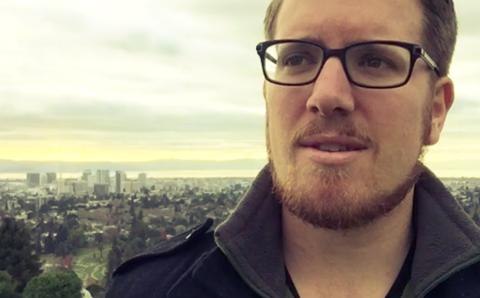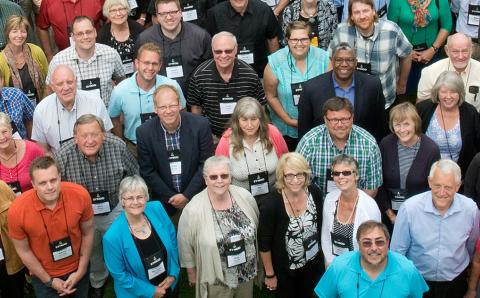Editor’s note: This is the first in an occasional series of profiles on the lives of Christian Reformed people who are living out their faith every day.
As a young girl, Ida Kaastra often recited the theme verse of her girls' club at her church in rural Ontario. For her, the challenge of Micah 6:8—“What does the Lord require of you but to do justice, love mercy and walk humbly with your God”—was mental work, rather than missional. Now that same verse is a daily touchstone in her work as director of World Renew Canada.
But it was a circuitous route that brought her out of the cornfields of Southwestern Ontario to the conflict zones of east Africa and back again.
Let’s start this story near Aylmer, Ont., on the Kaastra dairy farm.
Ida, the eldest of nine children, grew up in a family where work was both virtue and necessity. She remembered her stern father teaching her how to work the clutch on the tractor—slowly, slowly press the pedal or it’ll lurch and stall—when she was 4 years old.
She recalled hoisting manure into a wagon with a pitchfork taller than she was and stooking bales in the field as the hay clung to her sweaty face and arms. She was short, but wiry.
“I learned that on a farm you work long days, you’re part of a team. Everybody contributes.”
She attended Christian elementary school and Christian high school. Joined every sports team she could think of. Excelled at academics.
Then one day, during a rare moment of relaxation on the farmhouse porch, everything shifted. She was 13 years old.
"I noticed that the wind was very odd. It was blowing all around me but where I was was very still. It was like the presence of God was with me at that moment saying, 'Be still and know that I am God.' It was like a voice in my soul saying, ‘Ida, I want you to be a missionary.' "
She went inside for lunch and told her parents. Devout, twice-on-Sunday worshipers, they nevertheless weren’t convinced God spent his time sending messages to teenaged farm girls.
To Kaastra, though, the calling was deep and unequivocal. “For all the rest of my life, all my choices were centered around that."
Whom she dated, what she studied, where she lived—all were predicated on her conviction that her life must eventually lead to the mission field.
But then, when she was 15, just two years after she’d proclaimed her calling to be a missionary, her mother died of cancer.
For Ida, it was a wrenching personal loss. At the same time, she also had extra weight thrust upon her: her father said that as the eldest, she would be in charge of everything in the household—everything except physical discipline.
"It was the classic management dilemma of having all the responsibility but no positional authority,” she recalled.
That forced her as a teenager to negotiate, mediate, collaborate. With 12 years between the oldest and youngest, the siblings decided how to divide and rotate chores fairly. One would wash dishes and another would mop the floor; one would pare vegetables and another would cook. Together they milked the cows and fed the calves and mucked the barns. If one sibling missed an assignment because she or he had a soccer game, for example, someone picked up the slack but the absent person would have to do double chores next time.
The oldest children became a support team for the younger ones.
“As children together, we realized we as a team could support each other in grief and hardship and make the best of it.”
Stories of African anti-apartheid fighter Steve Biko and CRC missionary Johanna Veenstra reminded her daily of her mission, that her job was meant to be more.
“If [God] called young David and Moses, who was a reluctant leader . . . to something that was beautiful, then surely if I’m a willing servant of God’s, I can do this, and not for my glory but his.”
At a time when women couldn’t become preachers, she investigated how farm practices might help build food security and draw people out of poverty.
She studied agriculture and biology at Dordt College in Iowa and earned a Bachelor of Science degree in crop science from the University of Guelph in Ontario.
That set her on a path to development work, first as an intern with Christian Reformed World Relief Committee (CRWRC, now World Renew) in Grand Rapids and then as a program development consultant in northeast Uganda in partnership with a group called Vision Terudo.
In 1985, a military coup took place, and her home in Uganda became part of a war zone. Soon after that came cattle raiders who burned huts and shot her neighbor. Then they stood outside her door arguing whether or not to break into her little home to kill her too.
As she wrote years later, “I pray like I am sweating drops of blood. Death is waiting and I am terribly, deeply afraid.”
The men eventually wandered away and God’s words filled her again: “Love me. Love my people.”
She stayed and became Uganda field director for CRWRC in 1989.
There that she met young lawyer James Mutoigo at a Baptist church in Kampala.
Together they worked to embody the mission they had separately been articulating. "He's a justice guy and I'm a mercy gal, and together we walk humbly with our God," she said.
Her father, finally reconciled to his eldest daughter’s life as a missionary and to her love for Mutoigo, flew to Kenya en route to Uganda to give his blessing at their wedding. But days before the ceremony, he had an embolism.
Instead of welcoming her father to a wedding, Kaastra found herself planning both a funeral and a wedding.
“I entered marriage with a different platform. It’s not that you’re going to have a life that’s free of trouble. Death is a part of it. Illness, suffering is a part of it. But God is also a part of it,” Kaastra-Mutoigo said. Birth is also a part of it. Their son Bryant (one of three Mutoigo children) was born in Uganda before the family moved back to Canada in 1994.
Ida served as ServiceLink coordinator for five years until, in 2000, they returned to Africa, where she became team leader East and Southern Africa through CRWRC.
When the position came up for a new Canadian director of World Renew, ministry leaders urged her to apply. Synodical leaders appointed her to the post in 2006.
World Renew’s aim, she said, is also the intrinsic mission of the church.
And that mission continues to be one in which discipleship is key, where the depth of Micah 6:8 continues to resonate for those working to bring a message of hope for oppressed and impoverished people:
“We are compelled by God’s mercy, by God’s grace, by God’s justice to go out into the world and change the story,” she said.









